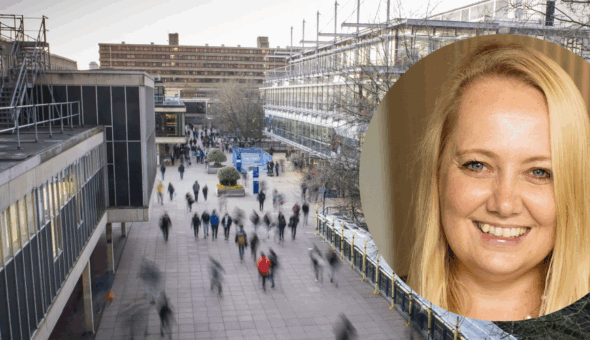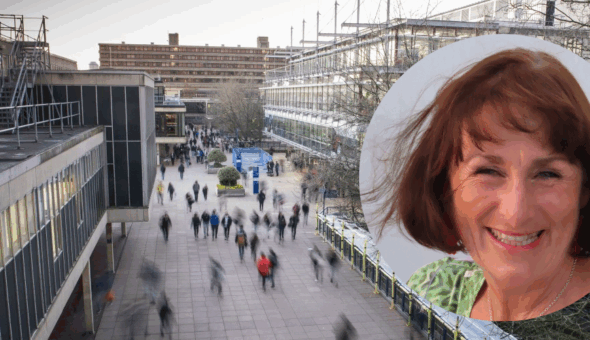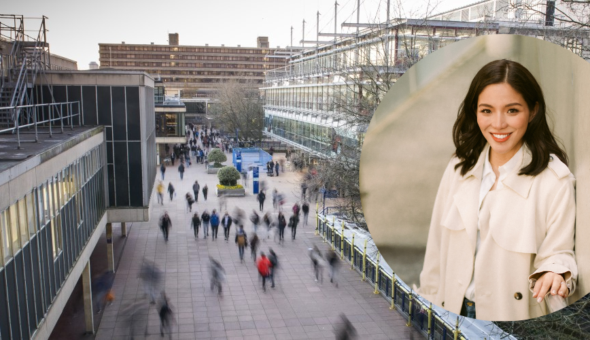Rakesh Sharma OBE describes his time completing an Executive MBA in business administration at Bath as a "dress rehearsal for everything that was to come both personally and professionally."
He has held a number of senior industry roles and was elected as a Fellow of the Royal Academy of Engineering in 2016. In 2017 Rakesh was honoured with an OBE for services to defence capability and was named as a BAME 100 Business Leaders finalist in 2019.
 Why did you choose to study at Bath?
Why did you choose to study at Bath?
When I graduated from the University of Nottingham having read physics, I joined Marconi Communication Systems as a Junior Development Engineer. Six years later, having risen through engineering management scale and obtained a patent for my work, I was head-hunted by what was then Dowty Sonar & Communication Systems (SCS). To secure me, they agreed to send me on a Diploma of Management Studies (DMS), because that was what I was going to do at the GEC Management College at Dunchurch.
In everyone’s career there are a handful of people who help nudge you and send you into a different orbit. One of those people for me was Gavin Rendell, the HR Director at SCS. Unbeknownst to me Gavin convinced my then boss and the Managing Director that, "if we’re going to pay for him to do a DMS at a local college, then why don’t we put him forward to do the Group-sponsored Executive MBA at the University of Bath?"
Dowty Group was one of the original five founding companies of the EMBA and every year they sponsored two employees to do the part-time EMBA. Gavin further explained his comment: "if he gets on it, it will be good for him, but it will also be good for us. Group will have to recognise the calibre of people we have in our company." Thank you, Gavin, I owe you so much.
Did you have a particular career in mind when you chose your course?
Growing up in the ‘70s, I was heavily influenced by a BBC TV programme called Troubleshooter starring Sir John Harvey Jones, who was at the time the CEO of ICI. The premise was that Sir John would be parachuted into a company that was having some serious difficulty in some aspect of its trading.
He would spend time inside the company talking to employees on all levels, analysing and understanding what had gone wrong. He would then prescribe to the executive team with what needed to be fixed and how. It didn't matter which sector was the focus or what the company did. Sir John seemed to be the font of all wisdom. I thought to myself, "one day I want to be able to do that."
Having read physics at university gave me the ability to think in concepts, frameworks and models. I then started a career as an engineer, and worried that I would get compartmentalised as a 'techy'. Thus, I wanted to do the EMBA firstly to learn the skills that Sir John had, and secondly to demonstrate that I could be more than an engineer.
What can you tell us about your experience of studying here?
The first 'light bulb moment' was learning from my classmates – who were from all sectors, from milling to clothing retailers – that underneath all the sector-specific stuff, we all experienced the same sorts of problems. I would never have realised that without the exposure on the EMBA.
Secondly, learning the ability to vocalise thoughts and opinions and then defend them against the best and brightest minds – the professors as well as my classmates. The professors would talk about the latest concepts, models and research and, instead of writing it all down without critical analysis, we would challenge and remark: "it doesn’t work like that in the real world". This would lead to a debate where I learned as much from the discussion as I did from the lecture.
Any favourite spots to visit in the city?
The chip shop near the Abbey! I don’t even know if it is still there, but it was a frequent stop by our entire class on a Friday night out. Not only were the fish, chips and mushy peas to die for, but you could eat-in at tables with red chequered plastic tablecloths and a mug of piping hot builders' tea! I’m not sure whether it was really that good or whether it tasted better after a night of drinking beer!
Describe your career journey since graduating.
SCS and six other businesses from the division were the subject of a management buyout in the middle of my research dissertation. Dowty Group was acquired by Tube Investments in probably the last hostile takeover of the '90s.
SCS led the buyout and the company’s marketing director became the Group Marketing Director. Very quickly he decided that he couldn’t do both jobs to the level that they demanded. The CEO who had been the MD at SCS (the company that sent me on the Bath EMBA) said, "Rakesh has graduated from Bath, let’s see if he wants to be a marketing director. He’ll be the most qualified marketing director we’ve had (tongue-in-cheek) and we can get something back from the money we’ve invested in him."
When approached, I jumped at the chance. Having been part of a small team making the Group’s first classified acquisition in the US, I was asked to relocate to up-state New York to help integrate the newly acquired company into the Group. I couldn’t be the President as it was a classified company and I was a UK citizen. Instead, I helped set up the Special Security Agreement with the US Government and served on the Board as an inside Director.
This was the point I learnt to design a role ensuring that responsibility, authority and accountability were in one person's hands. Group made me responsible for the company’s performance and held me accountable if it didn’t, but I had no authority to make anything happen because I wasn’t a cleared US citizen. It was a unique situation and for a long time the Defence Security Service used how I operated as a training case for their agents.
It was therefore necessary to learn and hone the skill of influencing. I couldn’t officially decide anything – everything had to be through debate and influencing the company’s president.
My time on the EMBA was critical to my success in this role.
Having turned the company around, completing some difficult engineering programmes and delivering the highest net margin in the Group, I was plucked out and parachuted into a newly acquired company in Staffordshire which also needed re-structuring, a new strategy and a return to profitability.
I was there three years and I’ve found that this has been a constant in my career. Until I became Chief Executive, I had been moved on every three years. The first year is about learning what the problems are and implementing changes. The second year is building the strategy and delivering profits. The third year is making sure that the second year wasn’t a flash in the pan.
How did you progress to become CEO?
Almost accidentally I became the company troubleshooter and ended up doing what I had watched on TV all those years ago. Every time I was parachuted into a new assignment, it was at an increasing level of responsibility – one small company, two small companies, two large companies, half a division, the whole division, a second division, COO and then CEO.
Of the 78 acquisitions that Ultra had done, I had led on 54 of them, ranging from £250K to £250M. My ability to vocalise my thoughts in clear and unambiguous language was critical when dealing with financiers, lawyers and politicians. The Bath EMBA was a great dress rehearsal for everything that was to come.
Surprisingly, I was hesitant about taking the CEO job. Most leaders that I know, the good ones anyway, are unsure of themselves in their private moments. Outwardly they must express confidence in their vision but inwardly moments of self-doubt can be common. It is these moments of self-doubt that I believe spur people on to achieve remarkable things. People are trying to prove that they deserve to be there!
I semi-retired at the end of 2017 having been CEO for six years. These days I have a plural career as a Non-Executive and Chair. I decided after retirement that I would spend a third of my time doing paid work, a third of my time doing pro-bono work (especially in the education sector with socio-economically disadvantaged kids) and the final third of my time drinking the wine that I have accumulated over the years. If only I could find that chip shop again!
You've spoken with Bath before about how we can close the BAME leadership gap and better promote diversity. Is this something you feel starts at a university level?
I dislike the term BAME as my experience as a British Asian is by no means as extreme or comparable to British Black person and calling us BAME diminishes those experiences.
There has been a lot of gender and racial equality progress since I was a teenager in the ‘70s but there is still a lot to do. We all have a duty to call out inequality when we see it.
I have never been prouder of my wife than when she chased a man down the road who had posted a racist political pamphlet through our letterbox for a forthcoming election. She thrust his pamphlet back into his hands and told him never to post such rubbish through our door ever again. The man was left speechless, especially as my wife is white. My wife is not a woman to be messed with!
Levels of racism are rising now, as they always do during economically difficult times. People want to blame someone or something for the hard times that they are facing, and it often becomes the 'unknown' or the 'strange' that bears the brunt of all blame.
So, although the University has its part to play in achieving a fairer society, if we are going to achieve that goal it must start much earlier. I don’t mean to say that you should be violent in creating change, in fact the opposite is true: violence plays into the hands of the misogynists and racists. We must draw out these opinions and then engage with the people holding them to help them understand the effects of inequality so that it becomes socially unacceptable to hold such views.
Once upon a time it was considered completely acceptable to drink and drive. It wasn’t the change in law that affected the change to how we think about drink-driving today. It was the social pressure of an ever-increasing larger number of people disapproving of the habit. The same must be true of misogyny and racism.
What more can Bath do to support diversity in our next generation of leaders?
A friend of mine said it the best; ethnic minorities and women are not looking for the bar to be lowered, they want the gate to be widened.
The University doesn’t need to teach about the misogyny or racism; individuals have experienced it first-hand. The University needs to encourage safe spaces for free speech so that emotional subjects can be debated, and people can be educated in inequality.
I’d also recommend teaching resilience when mentally coping with abuse. As a teenager, walking down the road and being called a ‘wog’, or in one incident being attacked by four men carrying chains and pick axe handles, it would have been easy for me to have been dragged into a cycle of violence. I was lucky to have a father who helped me cope and made me determined to succeed and show everyone who I was. These are the reasons why in my pro bono life I work in the education sector. I have a fundamental belief in aspiration, education and opportunity.
The younger generations need to aspire to do something with their lives. If you don’t aspire, then you don’t try. Education is not a guarantee, but it increases the probability of being successful in your life’s dreams. Education could mean anything from an apprenticeship to learning to work with your hands – it doesn’t necessarily have to be an academic qualification.
Finally, there’s no point having aspiration and education if you don’t have the opportunity to put all that into practice. The University has a part to play in all three aspects and I know it does so much already – it did all three for me.
How did your studies help you to develop?
Quite simply, I don’t think I would have been able to do all that I have without Bath having been a part of my life. It was a dress rehearsal for everything that was to come, both in my personal and professional life.
I still refer to the business frameworks and models that we studied on the EMBA. I was afforded the greatest luxury any businessperson can be offered – the ability to take time out every second Friday and Saturday to just think. Oh, and to have drink every other Friday night with your classmates!
What advice would you give to prospective students thinking about studying your course at Bath?
Why are you waiting? Just do it!
Respond



